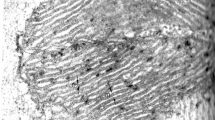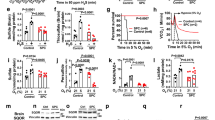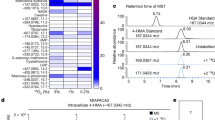Abstract
MY colleagues and I have been developing recently the theory that vitamin B1 is a specific factor in the oxidation system of pyruvic acid. In a search for substances which would inhibit specifically this action of vitamin B1 in its relation to the pyruvate oxidase of brain, I tried ten months ago the effect of dichlor-diethyl-sulphone (Cl.CH2.CH2)2 S.O2, for a specimen of which I am indebted to Dr. E. Walker. I am encouraged to communicate the results by the recent publication of Berenblum, Kendall and Orr1, who state that D.E.S. with tumour tissue inhibits respiration some 50 per cent and glycolysis some 84 per cent. I have found that the action of D.E.S. upon our brain respiration systems in vitro resembles in detail the effect of iodoacetic acid2; the significant points are as follow:
This is a preview of subscription content, access via your institution
Access options
Subscribe to this journal
Receive 51 print issues and online access
$199.00 per year
only $3.90 per issue
Buy this article
- Purchase on Springer Link
- Instant access to full article PDF
Prices may be subject to local taxes which are calculated during checkout
Similar content being viewed by others
References
Berenblum, Kendall and Orr, Biochem J., 30, 709 (1936).
Peters, Rydin and Thompson, ibid., 29, 53 (1935)
Author information
Authors and Affiliations
Rights and permissions
About this article
Cite this article
PETERS, R. Effect of Dichlor-diethyl-sulphone on Brain Respiration. Nature 138, 327–328 (1936). https://doi.org/10.1038/138327b0
Issue Date:
DOI: https://doi.org/10.1038/138327b0
Comments
By submitting a comment you agree to abide by our Terms and Community Guidelines. If you find something abusive or that does not comply with our terms or guidelines please flag it as inappropriate.



